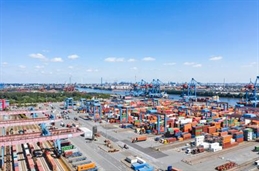
The coronavirus pandemic has reduced seaborne cargo throughput at the Port of Hamburg with first-half figures showing a decline of 12% at 61.2 million tons while container throughput was also down 12.4% at 4.1 million TEUs.
General cargo handling was 12.2% lower at 42.5 million tons, bulk cargo handling 11.7% down at 18.7 million tons and in the container handling segment, a total of 4.1 million TEU – 20-ft standard containers – were shifted across the quay walls, a 12.4% fall year-on-year.
More severe impact on Q2
“We are naturally not pleased about this trend, but the drop in the first-half throughput caused by the pandemic seriously affected all ports in Northern Europe. Owing to the weakness of the world economy and some withdrawals or considerable delays of global supply chains, as expected the effect turned out to be more severe in the second quarter than in the first three months,” said Axel Mattern, Joint CEO, Port of Hamburg Marketing.
Nonetheless, he noted the importance of continuing to provide cargo-handling and logistics services on a 24/7 basis despite difficult economic conditions, to ensure uninterrupted flow of goods.
Port of Hamburg said the largest volume fall on the previous year occurred on imports representing a drop of 16.3% in the first six months at 33.7 million tons, being considerably weaker than exports totalling 27.5 million tons, the downturn here being limited to a single-figure 6.1%.
On the import side, reduced steel production, in particular, led to lower throughput of ore and coal. Downturns of 24% and 10.5% were recorded for the part-segments grab and liquid cargoes. Meanwhile, agribulk throughput soared by 30.8% to 4.1 million tons.
Trade volumes with China down
On container handling, the Port said the slowdown was felt across its trading partners, noting that except for Denmark, six countries reported "substantial" double-digit downturns.
Its seaborne container throughput with China, its top trading partner declined by 16.4%. It dropped 14.9% with Russia, 13.3% with Sweden, 14.4% with South Korea, 10.5% with Poland and 2.7% with Denmark.
“The slowing down of the Chinese economy and the resultant cancellations of sailings on liner services – or ‘blank sailings’ in shipping parlance – led to lower throughput totals. With some delay, these repercussions were reflected in the first-half figures,” Mattern said, although he noted an initial recovery on both the import and export sides of the China trades.
It's trade volumes with the US increased by 1.7%, with Singapore it was up 5.5%, the UK increased by 39% and Malaysia also up 1.7%.
“This strikingly good trend is attributable to the four Transatlantic services that started operating from Hamburg at the beginning of 2019. These have developed extremely well and ensured higher throughput volumes with the USA, especially on container services,” said Mattern.
Worst is over
For the next few months, Axel Mattern and Ingo Egloff, his fellow CEO, said initially the Port of Hamburg can adapt to a continuation of blank sailings and a slow recovery in total throughput.
“In the past two months, a stabilization of vessel sailings has been achieved. With the economy in China and Europe gradually picking up, I am confident that we have meanwhile reached the lowest point of the fall in seaborne cargo throughput caused by the pandemic, and will see a first noticeable recovery and improvement in the situation by the end of the year,” Egloff said.
While being almost 12% lower by comparison with last year, in June, for example, output in the manufacturing industry was already 8.9% up on the previous month illustrating the dramatic aspect of economic development.
“Even if the export side is reporting some growth, it will be some time before we are again at pre-crisis level. And here we have entirely ignored trade wars, sanctions, and corona outbreaks in other parts of the world. On top of that comes German reluctance to consume, the impact being put at 130 billion euros. That naturally depresses imports of consumer goods such as textiles,” he added.
With these developments, the Port of Hamburg said a “very fine throughput figure similar to last year’s can no longer be achieved this time.”




